The EU Spring Summit
What is the EU Summit?

The EU Summit is a meeting of the 27 heads of state of the European Union. It takes places in Brussels at least twice a year. It is chaired by the President of the European Council (currently Herman Van Rompuy). The president of the European Commission (currently José Manuel Barroso) and the EU’s High Representative for Foreign Affairs and Security Policy (currently Catherine Ashton) also take part.
What is the purpose of the EU Summit?
It sets the EU’s general political direction and priorities. The decisions are taken based on the proposals presented by the Commission and the Council in the weeks and months before the Summit.
What is the agenda for this EU Spring Summit?
The European Council will assess how the member states are implementing the last country-specific recommendations and will provide assessment and guidance to enforce them.
This assessment and guidance by the Council will be highly influenced by the European Commission agenda for 2013-2014.
What is the agenda of the European Commission for 2013-2014?
The Commission work program for 2013 mainly focuses on getting Europe out of the crisis and stimulating sustainable growth.
However it emphasises that a genuine Economic and Monetary Union is the critical means to achieve those goals.
What is the plan for a genuine Economic and Monetary Union?
The Council and the Commission have outlined its construction in several phases, moving ahead with initiatives already in process of implementation...
- 'Six pack'
- 'Two pack'
- Treaty on Stability, Coordination and Governance in the Economic and Monetary Union
- ...and making new proposals.
If fully implemented this plan would have two main outcomes:
- The creation of a banking union, whose main pillar would be a Single Supervisory Mechanism for all European banks (starting with the Eurozone), controlled by the European Central Bank.
- The creation of a Fiscal Union, which would mean the imposition of automatic sanctions for those countries that do not follow the economic policy directives from the Council and the Commission.
How this would affect me?
The Single Supervisory Mechanism would be controlled by the European Central Bank, which has no democratic control whatsoever and is dominated by finance sector interests and lobbies. This new body would have the power to bail-out any bank of the Eurozone at the expenses of tax-payers money.
The bail-outs to the finance sector executed since the beginning of the crisis have been the main reason for the current budget deficits of the European countries and their high levels of debt. The EU has forced European countries to reduce these deficits through the reduction or elimination of social benefits and services, privatization of rights such as health care and education and the sell-off of common goods.
Furthermore, these bail-outs have not contributed to overcoming the crisis; they have merely allowed finance institutions to maintain their positions of power.
The Fiscal Union would oblige any elected European government to enforce only the policies authorized by the Council and the Commission. Since the crisis began, many of the policies produced by both instiutions have amounted to an unprecedented attack on welfare, social rights and democracy. This is most clearly reflected in the EU policies that impose austerity, demand deep cuts in social spending and attempt to weaken labour laws and roll back hard-earned labour rights.
The Fiscal Union would mean that the neoliberal economic doctrine of the Commission, the European Central Bank and the International Monetary Fund (aka the 'Troika') would become institutionalized at the European level. All member states would lose their sovereignty in economic and social policies. Democracy as we currently understand it would end in Europe.
The non-democratic character of these reforms has already been proved. The popular resistance against these austerity and privatisation policies has been violently suppressed, with the silence and indirect support of the European Union institutions.